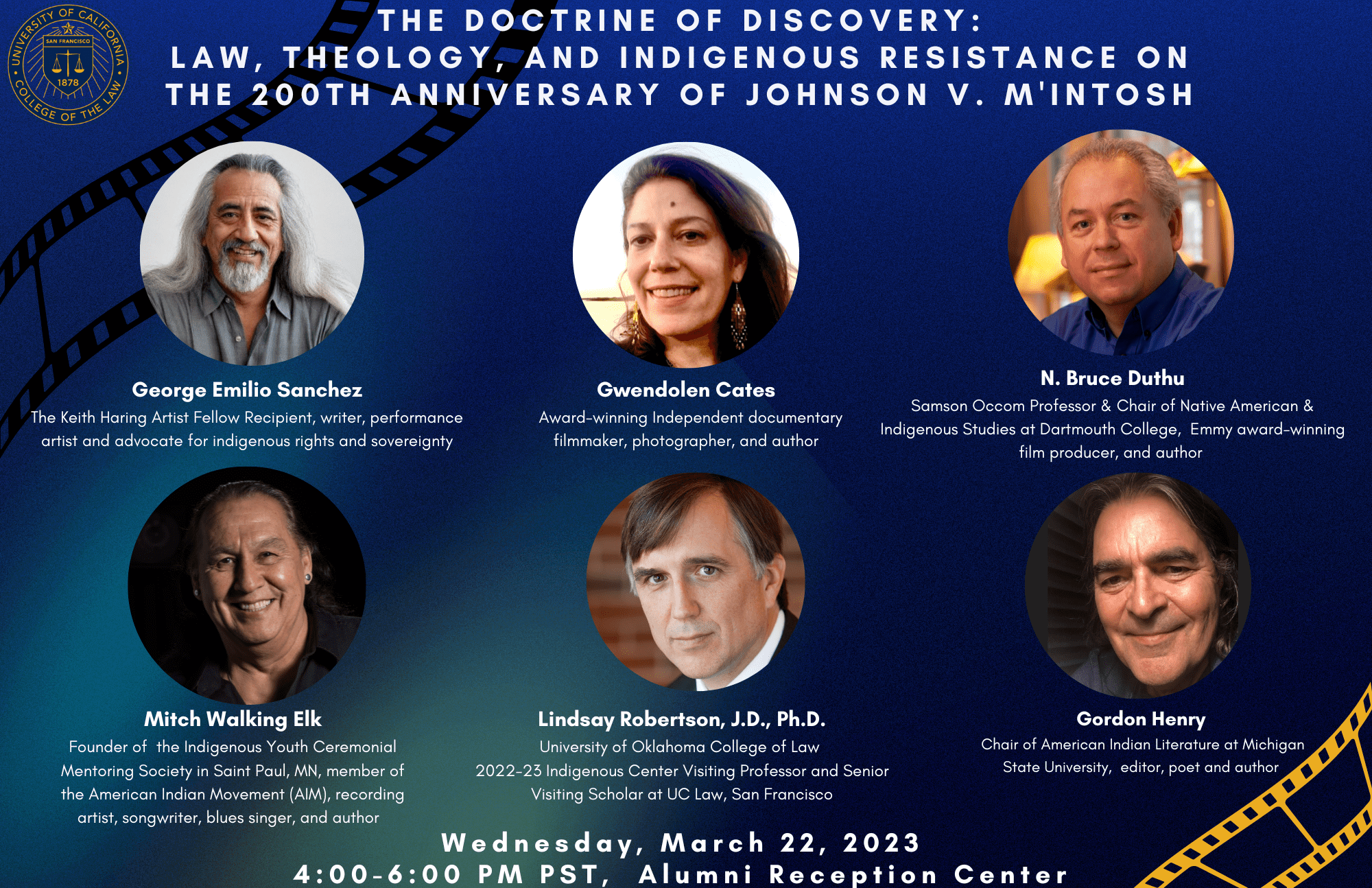UC Law SF Film Debut Event Looks at Legacy of Indigenous Land Rights Case
 A film premiere, poetry reading, and panel discussion featuring Indigenous artists and activists, law professors, and an award-winning filmmaker will take place at UC Law San Francisco on March 22 to mark the 200-year anniversary of a Supreme Court ruling that redefined Indigenous land rights in the U.S.
A film premiere, poetry reading, and panel discussion featuring Indigenous artists and activists, law professors, and an award-winning filmmaker will take place at UC Law San Francisco on March 22 to mark the 200-year anniversary of a Supreme Court ruling that redefined Indigenous land rights in the U.S.
The event on Thursday, March 22, at 4 p.m. at Mary Kane Hall, 200 McAllister St., will explore the global impact of the 15th century Doctrine of Discovery, an international legal principle issued by the Vatican that declared Indigenous lands “empty” and up for grabs. The Doctrine was embraced by the U.S. Supreme Court in its 1823 decision Johnson v. M’Intosh.
“It is the foundational Indigenous land rights decision throughout the English-speaking world,” said UC Law SF Visiting Professor Lindsay Robertson. “It’s the case that adopted into U.S. law the Discovery Doctrine, which provides that upon discovery of the New World, Europeans acquired instant ownership of the underlying title to Indigenous lands.”
The event is free and open to the public, but attendees must register online in advance.
The event will include:
- The debut of the work-in-progress feature documentary film, “The Doctrine” by award-winning independent filmmaker and photographer Gwendolen Cates.
- A poetry reading by Anishinaabe poet and novelist Gordon Henry, who chairs American Indian Literature at Michigan State University
- A reading of an excerpt from the play “In the Court of the Conqueror” by acclaimed playwright George Emilio Sanchez
- Remarks by Robertson and N. Bruce Duthu, an internationally recognized Houma scholar who chairs the Department of Native American and Indigenous Studies at Dartmouth College
- An appearance by Mitch Walking Elk, a Southern Cheyenne and Arapaho traditional elder who founded and mentored a group of Indigenous youth in Minneapolis/St. Paul and who is featured in the film, “The Doctrine”
- A panel discussion and question-and-answer session after the movie
Running approximately 75 minutes, the film traces the history of the Doctrine of Discovery back to 15th century Europe. It follows a group of Indigenous youth from Minnesota to the Vatican, where they ask church leaders to repudiate the centuries-old Doctrine. It also explores modern resistance movements by Indigenous groups in Guatemala, New Zealand, and other nations.
Cates said her film tries to make history come alive, including by following a young Indigenous woman from Minnesota to Spain and Portugal, where she views the original 15th-century documents that gave Christian explorers and missionaries the legal right to take over Indigenous lands. The filmmaker said she intends to show how the Doctrine of Discovery affects Indigenous communities globally and enables corporate forces driving climate change.
“I hope that the film educates a broad audience about the Doctrine of Discovery, its impact on Indigenous Peoples and the planet, how relevant it is to our lives today, and that it encourages people to support the Indigenous-led movement for repudiation,” Cates said.
Robertson serves as visiting professor with the Indigenous Law Center at UC Law SF for the 2022-2023 academic year. He wrote the 2007 book, “Conquest by Law,” which explores how Johnson v. M’Intosh became the basis for federal Indian law and allowed Andrew Jackson to remove Native American tribes from the Southeast, opening the land to plantation slavery and eventually leading to the Civil War.
“Many law students read this case in property law courses without realizing it’s still a major driving force globally in the relationship between colonizing states and Indigenous Peoples,” Robertson said. “We hope to provide a broader context about this case and the doctrine.”